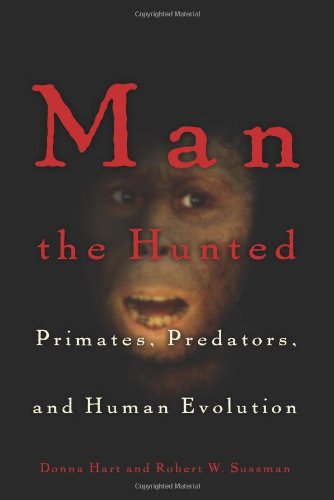 Reddit reviews Man the Hunted: Primates, Predators, and Human Evolution
Reddit reviews Man the Hunted: Primates, Predators, and Human Evolution
We found 2 Reddit comments about Man the Hunted: Primates, Predators, and Human Evolution. Here are the top ones, ranked by their Reddit score.

Used Book in Good Condition
True confession - I come at these questions from the croc side of things, so I don't often dig into the hominin side of the equation. (I leave that to you guys, the paleoanthropologists). However, there are several papers out there describing croc bite marks on our relatives. It's not hard to imagine that having large ambush predators hiding in any available water source would have made east Africa a dangerous home for early hominins (and sometimes modern humans). Since you've outed yourself as a phd student, have some citations:
Brochu, C.A., J. Njau, R.J. Blumenschine, and L.D. Densmore, 2010. A new horned crocodile from the Plio-Pleistocene hominid sites at Olduvai Gorge, Tanzania. PLoS One, 5(2): e9333.
Brochu, C.A. and G.W. Storrs, 2012. A giant crocodile from the Plio-Pleistocene of Kenya, the phylogenetic relationships of Neogene African crocodylines, and the antiquity of Crocodylus in Africa. Journal of Vertebrate Paleontology, 32(3): 587-602.
Davidson, I. and S. Soloman, 1990. Was OH7 the victim of a crocodile attack? In Problem Solving in Taphonomy: Archaeological and Palaeontological Studies from Europe, Africa and Oceania. Eds. Solomon, S., I. Davidson, and D. Watson. St. Lucia, Queensland: Tempus, 197-206.
Gebo, D.L. and E.L. Simons, 1984. Puncture marks on early African anthropoids. American Journal of Physical Anthropology, 65: 31-35.
Njau, J.K., 2012. Reading Pliocene bones. Science, 46: 46-47.
Njau, J.K. and R.J. Blumenschine, 2006. A diagnosis of crocodile feeding traces on larger mammal bone, with fossil examples from the Plio-Pleistocene Olduvai Basin, Tanzania. Journal of Human Evolution, 50(2): 142-162.
Also, there's a great half-science/half-pop sci book on predation on hominins called Man the Hunted that surveys a lot of the evidence with citations. Again, just reach out if you have trouble finding or downloading these. Good luck with your dissertation! I'm always on the lookout for more studies on croc predation in the fossil record.
​
I have no idea about AI and machine learning (evolutionary ecology and math background at the moment), so I have a question that may seem ignorant. Why don't AI researchers, like the guy in this article, make it the other way around? As in, it is the machine intelligence that feels it has the world against them?
Wouldn't it make more sense for an AI -- from adaptation point of view -- that human players are seen as the predators, while the AI is seen as a prey, and has to adapt accordingly? This mirrors human evolution a little more realistically anyway (the fact that humans evolutionary lineages were for a long time prey-species, rather than apex-predators, and they eventually made that transition over long time periods).
Essentially I'm interested in why they choose to have the AI as what seems to me as 'super-strong' in numbers. It seems to go against the history of warfare as well. Very cunning, and adaptive individuals can outwit large numbers. While the more conventional mass armies tend to be rather stupid.